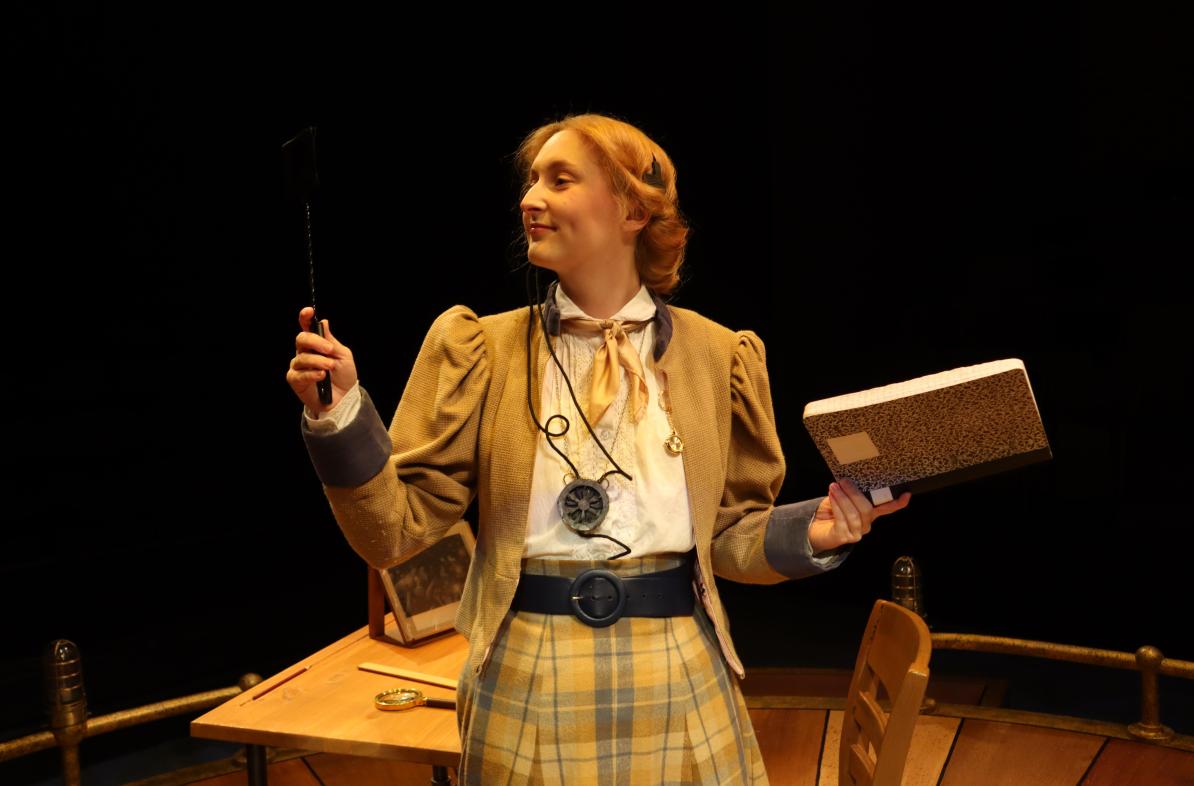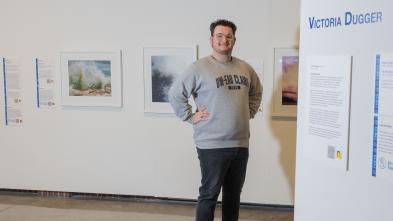
UW-Eau Claire presents mainstage production 'Silent Sky'
In recognition of National Women’s History Month, the first spring mainstage production for the music and theatre arts department at the University of Wisconsin-Eau Claire is “Silent Sky” from Lauren Gunderson, the most prolific and currently most produced playwright in American theater.

In "Silent Sky" three real-life Harvard lab "human computers" are depicted, from the left Henrietta Leavitt (senior Emily Szymanski), Williamina Fleming (senior Kate Konrardy) and seated is Annie Cannon (senior Lilly Maeder).
Show director Jennifer Chapman, professor of theater arts at UW-Eau Claire, is thrilled to bring such a renown and important production to the campus stage, a play that brings to life the true-life story of pioneering astronomist Henrietta Leavitt, whose discoveries in the early 20th century laid the bedrock of astronomical science for the decades to follow.
“’Silent Sky’ reveals the groundbreaking work of a small group of women at the Harvard Observatory Laboratory in the early 20th century,” Chapman says. “Their work was critical in developing a scientific understanding of the distance between stars and the size of our universe, yet their story remained largely untold.”
In this poignant tale of gender discrimination in the history of science, the story of the central character Leavitt, according to Gunderson, “explores a woman’s place in society at a time of immense scientific and heart-bound discoveries. With music and math bursting forth on stage, Henrietta and her female peers change the way we understand both the heavens and Earth.”
Small cast + emotional performances = intimate powerful show
With a cast of five Blugold actors, “Silent Sky” relies heavily on strong character development in taking the audience on an “emotional rollercoaster,” according to senior theater arts major Emily Szymanski in the lead role of Leavitt.
“In a show about real people it’s important to unpack their history and experiences to understand what they're feeling and why they are who they are,” Szymanski says. “I really wanted to portray Henrietta as accurately and honestly as possible. She deserves to be seen and heard, so I can't falsify any of that.
“Henrietta experiences so many emotions — there’s thrill, passion and drive, but also heartbreak, dread and grief. It's a heavy weight on my shoulders knowing how her story ends and having to put myself into her shoes in those moments, but I love simply being able to tell her story.”
Szymanski, like many, did not previously know who Leavitt was or the magnitude of her discoveries. She says that the opportunity to “tell this woman’s truth” and shed light on her contributions is a tremendous honor during Women’s History Month.
“It really is about the women in the observatory and their importance to the history of science,” the Milwaukee native says. “So often we don't hear about the accomplishments of women, they're just forgotten or tossed aside. I love that we have the chance to tell this beautiful story now when it's such a hugely important part of women's history. I mean, Henrietta changed everything.”
For Szymanski, “Silent Sky” is her fifth UW-Eau Claire theater production as an actor; she has been stage manager and producer in two others.
Playing the role of Szymanski’s sister on stage is freshman musical theater major Alexcia Johnson, a McFarland native who was an ensemble and chorus member in two previous campus shows. This, however, is her first major role in a mainstage play, and one she has found to be both challenging and fulfilling.

Freshman musical theater major Alexcia Johnson has enjoyed the challenge of so much music to learn for "Silent Sky," as her role of church-going Margaret Leavitt required a lot of singing.
“I play Henrietta’s younger sister Margaret, who is the opposite of her sister,” Johnson says. “A major theme of the story is ‘science vs. religion’ and Margaret is on the side of religion. I believe that this playwright presented this debate in a meaningful way that does not condemn one side or the other.”
In addition to the challenge of learning many songs for piano and vocals, and playing a much older woman than herself, Johnson really appreciated how Gunderson wrote this play in a manner that presents several historical issues in subtle ways to make people think, but not feel forced to see issues a certain way.
“Take the women’s suffrage movement, for example,” Johnson says. “I love how the playwright progressed into this idea but never made it about the issue. It’s always about the discovery and underlying elements, which makes the show so much more vulnerable and real.”
While the character of Leavitt’s sister Margaret was in fact fictional, senior Lilly Maeder plays one of the actual Harvard lab staff members, Annie Cannon who is credited with creating the system for classification of stars by color. In her role as dramaturge for the show, Maeder is tasked with research to make many elements of the show accurate, so she is confident in the representation of this historical figure.

One of many scenes of Henrietta Leavitt (Emily Szymanski) and Annie Cannon (Lilly Maeder) discussing their astronomical findings in the Harvard lab.
“She is a ‘boss lady’ in this story, and is a feisty character,” says the musical theater major from Delano, Minnesota, a veteran of six main stage shows at UW-Eau Claire. “It’s been tricky to do her justice but bringing her to life has been a great pleasure. Without these long-forgotten women of science, learning the vastness of our universe may have taken much longer. Giving them voice has been a true honor.”
Maeder’s sense of responsibility to these women in history is shared by senior music major Kate Konrardy from Marshfield, who plays the third real-life Harvard lab “human computer” in the story, Scottish scientist Williamina Fleming.
“The accent took some work, but the best part of this role is bringing out Williamina's playful personality,” says the senior music major. “She loved to entertain at her home with colleagues and would always welcome strangers at the observatory with a cheerful tone of voice. It has been refreshing to play a character that shines as bright as Williamina does — she really is just an overall wonderful person.”
Seniors Emily Szymanski and Will O'Brien depict an intimate scene between Henrietta Leavitt and Peter Shaw, characters in "Silent Sky" who shared a long and complicated personal and professional relationship.
In the sole male role of the production, senior Will O’Brien portrays Peter Shaw, another of the fictional characters. O’Brien describes Shaw as “representative of a man who could have lived in this life at that time,” a character whose story arc proved to be a challenge in many ways for the English major from Rochester, Minnesota.
“Peter is a ‘stand in’ for all people who have benefitted from the work of others,” O’Brien says of the character who illegitimately used Leavitt’s findings in his own paper, despite his true affection for her.
“Peter finds redemption at the end of the show and becomes a wiser and happier person. It takes a lot of energy and focus to play out a life-long and complex relationship like Peter and Henrietta’s in just two hours. Portraying him was emotionally draining at times, but the challenge has been welcome. I've learned a lot about acting from this show.”
Pulling it all together: Stage manager Maddie Simmons
Senior theater major Maddie Simmons will graduate in May with extensive backstage experience in five previous mainstage shows as a Blugold, in roles ranging from assistant stage manager to lighting designer and master electrician.
“Silent Sky,” however, is her first and only mainstage show in the role of stage manager, a role she hopes to concentrate on in her future career in theater.

Stage manager Maddie Simmons prepares to start the show "Silent Sky."
“Building my stage management skills is so valuable because I hope to work as part of stage management teams for theater companies in the future,” says the Greendale native. “Adding this incredible production to my resume has been wonderful. I’ve wanted to do ‘Silent Sky’ since the minute I learned the storyline.”
“I find it fascinating that I’d never heard of Henrietta Leavitt before I learned of this play,” she says. “Her discovery led to many of the major findings about space and the stars, such as the idea that we can see stars thousands, if not millions, of light years away from the planet. She’s the reason we know these things — I find it mind-blowing.”
“This has been one of my absolute favorite show experiences. From the family we’ve built of this small cast, to the design team and the crew, I’m so proud of where we’ve come with this show.
“The message of Gunderson’s play is so important and being able to deliver it during Women’s History Month is especially rewarding. It’s so amazing to me that I get to help tell this story through the magic of theater.”
You may also like


